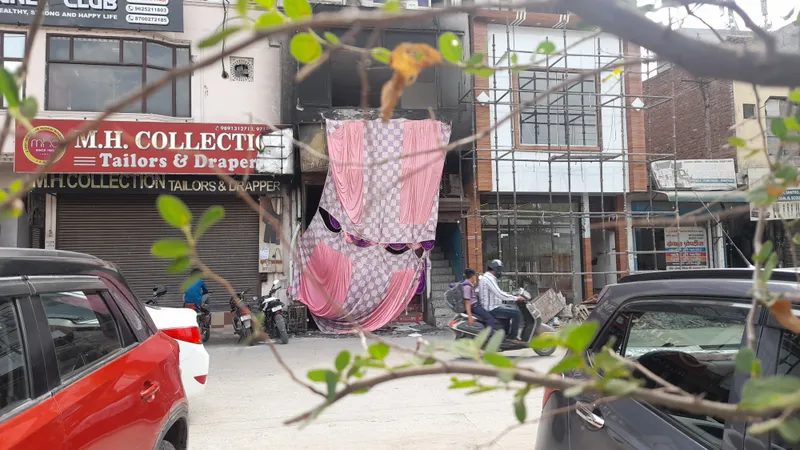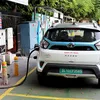Another Battery Smart swapping station catches fire; fourth in a year
Frequent fires at the Tiger Global-backed company’s swapping stations for electric vehicle batteries are raising questions on safety lapses, quality issues, and accountability.
Sayan Sen

Wednesday April 19, 2023 , 6 min Read
Between 12.30 pm and 1 pm on Monday, a battery swapping station in Delhi’s Janakpuri area caught fire. Located on the ground floor of a multi-storey building, the -operated facility housed about 50 battery packs meant for powering electric vehicles.
“I heard several loud fireworks-like sounds around 12:45 pm. Before I could make sense of it, we could see flames,” said Ekanth, the owner of a spare parts workshop a few buildings away from the station.
Tara, a staff member at a Reliance Smart store situated opposite the battery station, said she was alarmed by a loud noise and saw huge crowds gathering at the site.
The fire brigade arrived in about 15 minutes, but needed more than an hour to put out the flames, according to three eyewitnesses YourStory spoke with. Two people who were trapped on the top floor of the building were rescued uninjured by the firemen, according to the eyewitnesses.
All the battery packs were destroyed and burnt posters and stickers were scattered across the floor. Battery Smart-branded boards at the facility had been pulled down, and the front of the store was covered with cloth.
YourStory visited the site a day after the incident. Queried about the fire, a man who identified himself as the manager of the facility grew enraged and snatched the YourStory reporter’s phone and deleted all photos taken of the damage inside the facility.

The site covered a day after the fire incident. Image credit: Sayan Sen/YourStory
Pulkit Khurana, Co-founder of Battery Smart, said, a short circuit may have caused two battery packs to overheat, triggering the fire. The company is awaiting conclusive results from investigations, he added.
“At 12:40 pm, our IoT-powered system alerted us that two separate batteries were facing a spike in temperature. Within a minute, we informed the ground staff who followed protocol by switching off the main power source and deployed foam extinguishers. (But) they couldn’t control the spreading…, which led to all the batteries catching fire. The fire department was alerted immediately,” Khurana told YourStory.
This isn’t the first fire at a Battery Smart-operated swapping station. In January, a massive fire at a battery swapping facility in Lucknow’s Badshah Nagar killed one person. The incident was brought to light by two news outlets including Hindi language news channel ABP News. In May last year, a small Battery Smart outlet in Noida went ablaze. Two months later, a similar incident took place at another Battery Smart facility in Delhi’s Sitapuri region, The Ken had reported last year.
There have been at least three other incidents of a smaller scale involving Battery Smart facilities in the past year, according to two industry executives in the know. YourStory couldn’t independently confirm this.
While India has seen a surge in the number of electric vehicles on the road and related infrastructure in recent years, safety has emerged as a major concern. Reports of electric vehicles or facilities bursting into flames, although not too frequent, have grabbed attention, prompting the government to update safety standards for electric vehicles.
With Battery Smart in particular, the repeated fire incidents have some industry experts questioning whether the Tiger Global- and Blume-backed startup has taken sufficient measures to address the problems.
Khurana said three separate investigations are ongoing relating to the Janakpuri case—an internal probe, and an audit each by the fire department as well as the manufacturer of the batteries that likely triggered the fires.
He added that Battery Smart follows strict processes to ensure safety—including training franchise staff for emergency situations, conducting checks at all battery swapping stations every month.

Infographic by Chetan Singh
Who’s to blame?
Battery Smart has raised over $40 million in funding from investors including Tiger Global, Blume Ventures, Orios Venture Partners, and Stride Ventures.
The company follows a franchise model where it partners with mom-and-pop garages and small facilities to double up as its battery swapping stations. While Battery Smart supplies swappable batteries and sets up the infrastructure, the franchise owners provide the manpower to assist users, typically drivers of auto-rickshaws.
Fires at EV battery stations are generally triggered by faulty batteries, electric overload, or improper handling of the batteries by the staff. In the Janakpuri case, Khurana said the two battery packs were overheated possibly as a result of a short circuit.
Industry executives say that’s a big red flag.
“Even if excessive current passes through the batteries, there should be a miniature circuit breaker to cut the flow of electricity in time to stop the spread to other batteries,” said an industry executive, who did not want to be named. “It’s a clear case of a poor-quality battery.”
Battery Smart sources its batteries from about 10 manufacturers, including Livguard, Greenfuel and Lohum, unlike Chargeup that manufactures its own batteries.
“It is easy to pass the blame to (manufacturers) for building products without following adequate safety standards,” said another industry executive, also declining to be named. “Sourcing from multiple vendors disturbs uniformity and standardisation, and helps escape accountability.”
Battery Smart’s Khurana, when asked who should be held liable in such fires, said it was complicated.
“There can be various reasons for battery fires, right from a manufacturing defect to a mishandling of the battery. The question continues to be debated even at the policy-making level, so there is no clear regulation at the moment.”
Updated safety standards
The Ministry of Road Transport and Highways amended the AIS156 standards last year, stipulating tighter regulations and certification protocols to ensure the safety of electric vehicles.
The updated regulation mandates a redesign of battery packs and battery management systems, which would need approval from the Automotive Research Association of India (ARAI).
“This is likely to help standardise procedures and minimise fire-related mishaps,” said a mobility investor, asking not to be named.
Khurana insisted that all Battery Smart batteries were designed with strong fail-safe mechanisms and that both the batteries involved in the Janakpuri incident were by a manufacturer that supplies 5% of the firm’s batteries.
He declined to name the manufacturer but said the manufacturer was conducting a separate investigation to ascertain what went wrong.
“If the (manufacturer) supplies 5% of Battery Smart’s 50,000 batteries, that’s 2,500,” said the mobility investor quoted earlier. “A smart solution to ensure safety will be to recall the entire lot and start a thorough investigation.”
It's not clear if Battery Smart plans to recall the batteries but Khurana said the company has informed other manufacturers about the incident.
(The article has been updated to change the feature image, as well as clarify that Sheru does not manufacture its own batteries.)
(Cover image and infographic by Chetan Singh)
Edited by Feroze Jamal








